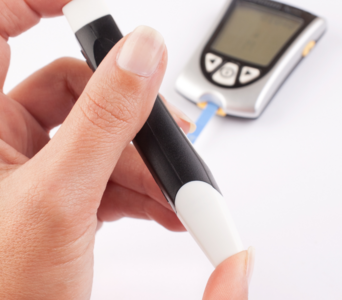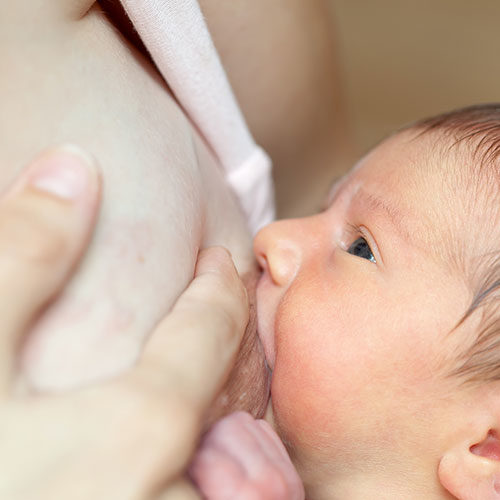How does Maternal Diabetes impact breastfeeding?
Types of Diabetes :
There are 3 main types of diabetes.
- Type-1: This type of diabetes is believed to be a result of the body’s auto-immune response. The immune system attacks the pancreas and destroys the cells that produce insulin.
- Type-2: This type of diabetes starts as insulin resistance which means that the body cannot use the insulin efficiently. The body produces more and more insulin to keep the blood sugar levels normal until it can no longer cope up with the need for it. It gradually results in high blood sugar.
- Gestational: Pregnancy causes some form of insulin resistance in the pregnant woman. In 2% to 10% of pregnancies, it transforms into diabetes and thus, called gestational diabetes. This is mostly temporary and goes away after the childbirth. But in up to 10% of women who have gestational diabetes develop women type-2 diabetes sooner or later.
Is it safe to breastfeed for a mother having diabetes?
It is perfectly safe to breastfeed while having diabetes. There are no risks to the baby. On the contrary, breastfeeding gives protection to the baby against both Type-1 and Type-2 diabetes. The medication (including insulin injections) are safe to take while breastfeeding and do not pass to the baby via breast milk. However, the mother may face low blood sugar because of the extra calories and energy burnt by breastfeeding. Therefore, it is important to monitor sugar levels and maintain them.
Breastfeeding Challenges for a Diabetic Mother :
Mothers having gestational diabetes are at an increased risk of having c-section and preterm birth. Gestational diabetes resolves after childbirth, but it doesn’t happen overnight. It can take up to a few days to weeks for blood sugar levels to return to normal. But for mothers having other types of diabetes, the challenges continue into and throughout their breastfeeding journey.
Diabetic mothers may experience a delay in milk production right after childbirth. This is expected. Antenatal colostrum harvesting can help in providing this liquid gold to the baby until the mother starts producing milk.
- Diabetes is one of the causes for low supply. Studies have shown that even after the milk comes in, diabetic mothers still produce less milk as compared to mothers without diabetes.
- Diabetic mothers are at an increased risk of developing mastitis.
- Diabetic moms are at an increased risk of developing infections like thrush.
How does Breastfeeding help a Diabetic Mother?
Breastfeeding increases the body’s insulin sensitivity and has long term positive effects on glucose metabolism. Breastfeeding has benefits for all types of diabetes.
- For Type-1 diabetic mothers (who need insulin injections) breastfeeding helps the body to require lesser amounts of insulin.
- For Type-2 diabetic mothers, breastfeeding reduces the severity of diabetes.
- For mothers having gestational diabetes, breastfeeding lowers the risk of developing Type-2 diabetes in the future.
- Breastfeeding delays periods which in turn delays the hormonal changes in the body which affect blood sugar levels.
- Breastfeeding burns calories and helps with weight loss. This helps diabetic mothers as obesity is closely related to diabetes.
How does Breastfeeding help the Babies of a Diabetic Mother?
Breastfeeding provides protection against diabetes to all babies irrespective of whether or not their mothers have diabetes. But in the case of babies of diabetic mothers, breastfeeding becomes even more important as they have a varying amount of genetic predisposition to developing diabetes.
- Preterm birth is not uncommon in diabetic mothers. As all preterm babies, preterm babies of diabetic mothers also benefit the most from their mother’s breast milk.
- Babies born to diabetic mothers are used to higher levels of sugars in the utero. These babies are at a higher risk of developing hypoglycaemia (low blood sugar) immediately after birth. Effective breastfeeding can resolve this. (Colostrum harvesting, if done, is very useful in this situation).
- Babies born to diabetic mothers are at an increased risk of developing neonatal jaundice. Breastfeeding can bring down the bilirubin levels.
- Babies born to mothers having gestational diabetes have a higher risk of obesity. Breastfeeding reduces this risk upto 50%.
Tips for effective Breastfeeding:
- Discuss colostrum harvesting with your medical care provider (gynaecologist + lactation professional) during pregnancy.
- Give skin to skin immediately after birth.
- Nurse the baby as soon as you can after the birth. Within the first hour is preferable.
- Good control of sugar levels will ensure efficient milk production and will reduce the need for supplementation.
- Get professional breastfeeding help sooner to avoid issues and work preventively.
- Keep healthy snacks and a bottle of water handy while nursing. Snacking at regular intervals (frequent small meals) helps in maintaining blood sugar level.
- Check your blood sugar levels before and after each feed.
- Know the signs of low blood sugar in you as well as your baby.
- Stay hydrated and relaxed.
- Nurse at least 8-12 times a day. (24 hours)
- Seek help immediately if you have sore nipples or other infection in the area or plugged ducts. This is to avoid the added risk of developing infections and mastitis due to diabetes.
- Rest and sleep as much as you can. That will also help in managing diabetes.
- Don’t get disheartened if you have to supplement. Know that each drop of breast milk that you provide to your baby is extremely beneficial to the baby.
References:
https://www.laleche.org.uk/diabetes-and-breastfeeding/
https://www.thediabetescouncil.com/can-you-breastfeed-if-you-have-diabetes/
https://dianaibclc.com/2014/05/06/insulin-resistance-and-lactation-insufficiency-faq/
http://www.lunalactation.com/06augcolor_diabetes.pdf
https://www.lllc.ca/thursdays-tip-breastfeeding-if-you-are-diabetic-or-insulin-resistant

Wish to speak with a member of our team who is a certified lactation professional and also an experienced breastfeeding mother, click on this link.
Medical Advice Disclaimer
THIS WEBSITE DOES NOT PROVIDE MEDICAL ADVICE.
The information, including but not limited to, text, graphics, images and other material contained on this website are for informational purposes only. No material on this site is intended to be a substitute for professional medical advice, diagnosis or treatment. Always seek the advice of your physician or other qualified health care provider with any questions you may have regarding a medical condition or treatment before undertaking a new health care regimen, and never disregard professional medical advice or delay in seeking it because of something you have read on this website.
Disclaimer
We understand and acknowledge that parents and babies can be of various genders on a spectrum of LGBTQI+. Families come in diverse flavours. However, in our articles, for the sake of simplicity and convenience, we will be referring to the breastfeeding parent as the mother and using the female pronouns- ‘she’ and ‘her’ for babies. Babies can be nourished and nurtured in different ways and while we have used the terms breastfeeding and nursing, we recognize that parents can opt to chest feed or finger feed.
We don’t have conflicts of interest and declare, and we are compliant with the WHO code of marketing of breastmilk substitutes and the IMS act.
In case you find any information on this website that needs to be updated, please write to us at info@bsim.org.in






